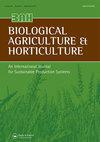Comparison of the effects of compost and vermicompost soil amendments in organic production of four herb species
IF 1.6
4区 农林科学
Q3 AGRONOMY
引用次数: 15
Abstract
ABSTRACT The aim of this study was to compare the effects of using compost and vermicompost as soil amendments in organic herb production, using four herb species (Dracocephalum moldavica L., Melissa officinalis L., Nepeta cataria L. and Thymus vulgaris L.) as model plants. Plants were cultivated in a greenhouse in containers filled with soil from an organically certified field and that had been amended with equal rates of cow manure compost or vermicompost [0%, 10%, 20% and 30% (v/v) for M. officinalis and N. cataria, and 0%, 20%, 30%, and 40% (v/v) for D. moldavica and T. vulgaris]. The four herbs showed different sensitivity to the incorporation of the organic amendments, with the optimum rate differing between the species: 20% was shown to be optimum for both amendments in the case of M. officinalis and N. cataria, and 20% for compost and 30% for vermicompost in the case of D. moldavica and T. vulgaris. However, at identical amendment rates, the vermicompost treatment resulted in higher plant biomass compared with the compost. The organic amendments tended to increase the concentration of K+ in the leaf tissue in all species. The NO3 – concentration in the leaf tissue tended to increase with increased rates of the organic amendments, but both amendment-specific and species-specific effects were evident. It was concluded that the use of vermicompost was superior to that of compost for organic herb production in containers.堆肥和蚯蚓堆肥土壤改良剂在四种草本植物有机生产中的效果比较
摘要以龙骨草(Dracocephalum moldavica L.)、梅莉莎(Melissa officinalis L.)、猫心草(Nepeta cataria L.)和麝香草(Thymus vulgaris L.) 4种草本植物为模式植物,比较堆肥和蚯蚓堆肥在有机草本生产中的土壤改良剂效果。植物在温室中栽培,容器中填满来自有机认证田的土壤,土壤中添加了等量的牛粪堆肥或蚯蚓堆肥[officinalis和N. cataria分别为0%、10%、20%和30% (v/v), moldavica和T. vulgaris分别为0%、20%、30%和40% (v/v)]。4种草本植物对有机改良剂掺入的敏感性不同,其最佳掺入率在不同种类间存在差异:马齿苋和木犀草两种改良剂的最佳掺入率均为20%,腐草和苔草堆肥和蚯蚓堆肥的最佳掺入率分别为20%和30%。然而,在相同的修正率下,蚯蚓堆肥处理的植物生物量高于堆肥处理。有机添加有增加叶片组织中K+浓度的趋势。叶片组织中NO3 -浓度随有机肥添加速率的增加而增加,但有机肥的特异性和种特异性均显著。综上所述,蚯蚓堆肥比堆肥更适合容器有机草本植物生产。
本文章由计算机程序翻译,如有差异,请以英文原文为准。
求助全文
约1分钟内获得全文
求助全文
来源期刊
CiteScore
3.30
自引率
6.70%
发文量
18
审稿时长
>36 weeks
期刊介绍:
Biological Agriculture & Horticulture aims to act as the central focus for a wide range of studies into alternative systems of husbandry, and particularly the biological or organic approach to food production. The Journal publishes work of a sound scientific or economic nature related to any aspect of biological husbandry in agriculture, horticulture and forestry in both temperate and tropical conditions, including energy and water utilization, and environmental impact.

 求助内容:
求助内容: 应助结果提醒方式:
应助结果提醒方式:


